This is Part Two of “Grounds for Optimism”, in which our fearless scribe goes to Chinese gardens, walking and running and thinking about things and then writing about them to dazzling effect. Part the First, on the “Humble Administrator’s Garden” in Suzhou, did its dazzling right here.
A few days later, in Beijing, I loosened my purse-strings again. Though I’d stayed, on a couple of prior visits, in a hotel near the Tiantandongmen station of the capital’s a-maze-ing subway system, I’d balked at the high walls and what had seemed like the rapacious price for a wander around the Temple of Heaven. (Tian Tan. Dongmen means the “eastern door” of this Ming and Qing dynasties-era complex of imperial gardens and temples.) On my second-last day in Beijing, I decided it might be worth running inside those walls, instead of on the chaotic surrounding streets. I had my usual sinking feeling at the entryway crowds, but the lines weren’t actually that long, and I found out that an entrance ticket – no access to the temple interiors, fine by me – was only 15 yuan. (You’re not paying $2.50 to go jogging, goofball. You’re running through Chinese history and culture for the price of a McChicken! Give your head a shake.)
The Tian Tan grounds are enormous, and yes, I got lost. I’d thought to run the perimeter and then see what I’d like to explore further, but after 35 wide-eyed minutes I wasn’t any particular where, as far as I could see. Well, I thought, I must be back near the East Gate by now, but I wasn’t. It didn’t matter. Even without entering The Hall of Prayer for Good Harvests – the “most famous temple in the world”, this under-educated Westerner was surprised to discover – or the Beamless Fasting Palace where Emperors purified themselves for weeks before their invocations of heaven, or viewing the Circular Mound Altar of sacrifice, I knew I’d be back for another tour the next day. Quite apart from the legends and the antiquity, there’s so much China in there, the parts just behind the walls of heavy traffic, the veils of pollution, and the look-how-modern-we-are! forests of shiny skyscrapers.
I guess I shouldn’t have been surprised, but it’s a People Place. (People’s
Republic. Go figure.) There are tonnes of tourists, absolutely, but what this one liked was the locals who also paid no attention to The Divine Storehouse and the Seven-Star Stones. Folks pay, I found out from a spry old dude with careful and sufficient English, 100 yuan for a year’s pass. They come, singly and in groups, for exercise, community, art, serenity and the most amicable kinds of noise. I walked and ran and watched and listened, and for a time I just lay on a bench looking at the sky through the branches of old cypress trees. Here’s what I saw:
♠ Whipcrackers. There are often old fellows doing some kind of percussive meditation with their bullwhips in Chinese parks. It doesn’t seem to be for money, though it always attracts a small crowd. Part of the reason I got lost was that a cracker was one of my landmarks, and when I heard the leathery gunshots again, I got confused. I’m HERE again? Or is this another guy marking his territory? I wonder what they’re doing, how this became a pastime for a few eccentric men. (Uh-oh. Googled this, and got several sites featuring male sexual enhancement. Gosh, fellas isn’t that a little obvious? It pays to advertise, so they say, but sheesh. That can’t be it.)
♣ Tai chi practitioners. (Tai ji in Mandarin.) Well, of course. I’m sure there would’ve been more of them if I’d come earlier in the morning. This is one of the loveliest sights in China, and if you’re an early bird, you can see it everywhere, but only among the old.
♥ Jianzi players. The Chinese sometimes call it “featherball”, if I ask for a translation. It’s a popular game, which I theorize might have been the inspiration for the “hackey-sack” circles formed by bored and marginalized boys (and the girls who identify with them) outside Canadian high schools. Seen ‘em? All feet, keep the beanbag in the air, preferably with hands in pockets? Well, it turns out that jianzi, played with a weighted bundle of feathers – like a colourfully mutant, overgrown badminton bird – is an ancient game in China, and good players find each other at Tian Tan. A couple of groups along a wide stone path invited me to join in, but they were WAY out of my league: leaping, twisting kicks with the right foot well behind and to the left of the other and, especially, stylishly dance-y boots where a player let the jianzi fly over his head and kicked it with the sole of his foot, nearly shoulder-high and blind and backwards, back into the midst of the group. Hao qiu! (“good ball”) I’d cheer for finely tuned kicks; piao liang! (“beautiful”) I’d shout for extraordinary moves, just as the Chinese commentators punctuate the action on NBA games. Smiles go miles.
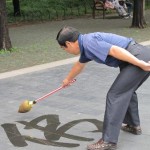
Even in an empty parking lot, let alone heavenly places, we sometimes see the water calligraphers, most ephemeral of arts.
♦ Musicians. I was fascinated by one guy playing a variety of lap-steel guitar, his little amps sending eerie echoes of Hawaiian and traditional American country music – yes, it needs to be said, “with Chinese characteristics” – bouncing across the paving stones, off the tourist signboards and stone walls, and across the tree-shaded lawns. It was weird and lovely.
♠ Card-players. All along the low balustrade surrounding one narrow covered courtyard, quartets of mainly fifty-plus Chinese perched on little stools, and laid their cards down on a surface maybe a foot wide. They kept a couple of stones on the wide rail; it was a windy day. Dozens of games were on, and some groups had even brought their own tiny makeshift tables. For many foreign visitors, this was as worthy of video recording as the interiors of the buildings were. I couldn’t help thinking I was getting a taste of an older China, some of the delicacies these older Chinese loved the best: friends, time, laughs, the outdoors. I would’ve loved to play a hand or two. I might’ve if my pu tong hua was better.
♣ “Red Songs” and hearty singers. I heard the brass first – I’m a sucker for brass bands, and still play the first few albums of the band Chicago for nostalgia and, gosh-darn it, some of that stuff still rocks and I’ll fight you if you make fun of me – and then felt the bass drum. As I got closer, the singing rose like a fervent tide, and I could see a large circle of standing people. The band was inside it, just a trumpet and a drummer plus a few saxophones, and so was a highly-animated conductor and his female sidekick, maybe his wife. I stood on the edge of the circle, again composed mainly of folks in their 50s and beyond, and watched and listened with surprising emotion. One man near me, with a strong voice, sang lustily and well and he didn’t need one of the red songbooks held by many in the circle. He was giving it his all.
I’d heard of the “red song” movement; the disgraced Communist Party power-player, Bo Xilai, former mayor of Chongqing and of my city, Dalian, had been among the proponents of returning to these patriotic old songs of the Communist era. (I know, the Party is still in charge, but resemblances to the China of the 1950s through the 1970s are not always obvious. State Capitalism – sorry, “socialism with Chinese characteristics”, please repeat after me, “socialism with Chinese characteristics” – is a mighty wind, and I get too much pleasure from the bemused looks and occasional nods on student faces as I suggest that “heck, my country is more socialist than yours!” Anyway. Bo Xilai is out of the political picture — he’s in jail, to be clear — but at least at Tian Tan, the Red Songs are not. “Ai Wo Zhongguo” with its thrice-repeated title chorus (“Love My China, Love My China, Love My China”) was one whose lyrics I could partly catch; it was number 78 in the book, I think. The woman would direct the assembled faithful to the correct page, and her husband (?) then lavishly encouraged their singing with his own, and with extravagantly enthusiastic waves of his arms. It was a revival meeting, without the tent.
And listen: I’m as wary of fervent patriotism as the next lover of social justice and world-mindedness, but I loved it. I imagined the dream they were trying to keep alive, and perhaps their fear that the good things of the “workers’ paradise” were being lost. (I do a lot of imagining in China.) I feasted on their togetherness, their care-free and open-throated enthusiasm. I wondered at this homely, low-tech combination of entertainment, social activism and old-time religion. It was a pretty small tribe, after all, and I wondered at what they thought they were doing, and envied, not just a little, their whole-hearted conviction in doing it.
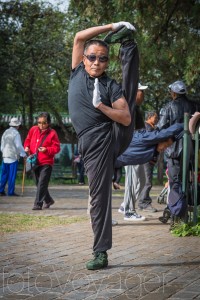
Chinese fitness treasures flexibility; my ex-dancer wife feels right at home, folks with heels over head in public places.
♥ Work-out demons. My wife had wanted me to make sure to catch this part, and once again she wasn’t wrong. (It’s getting annoying.) There is always, in Chinese parks and courtyards, some collection of apparatuses for stretching, and I found it on my way out of the Tian Tan grounds on visit number two. This open-air gym dwarfed anything I’d seen before, both in terms of the number and variety of inscrutable machines, and of the number of people gathered to make use of them. Again, they were mainly older folks; the young are charging stressfully along in one of the world’s most compelling rat races. I mainly use gymnastic parallel bars, or something resembling them, to do some “dips”, and then do what we used to call “chin-ups” on an overhead bar. I’m not much for stretching, though my body requires that I do at least a little of it among my preferred try-to-retain-a-little-masculine-mass exercises. Many Chinese elders do it religiously. I’d done my pull-ups on one of the bars of an odd structure that resembled a bright-yellow horizontal double ladder with curving rungs. Before and after my little strength show, I’d been impressed by a couple of women, and one man, who swung Tarzan-like along the ladder. Impressive, I thought. Pretty good strength and flexibility. They must be in their sixties, at least.
The man, friendly and open, whose careful English outstripped my Chinese, quickly switched to the former; he asked me where I was from, of course — it must be in the Meeting Foreigners manual — and explained the yearly pass system. Fifteen bucks a year: it’s a gym membership, cultural festival, garden pass and social club all in one, and I’d join in a second if I lived anywhere near heaven. He smiled, and did another swing along the bars, followed by one of the women. It wasn’t really my thing, exercise-wise, as I want to do repeat lifts of my body weight, and not just swing along from bar to bar. (Humility alert! Somehow, though, I didn’t hear the warning.) However, both my elders smilingly encouraged me to shi shi (give it a try). Couldn’t do it. At. All. Couldn’t hold my weight with one arm, let alone swing it to the next hand-hold. Wow. In hindsight, I was probably trying to muscle it too much, and if I worked on the rhythm of it, the forward movement and the twisting, maybe I could have done it. Maybe I’ll try it again when I’m ten pounds lighter. Yeah, I’ll show those guys. Next time I’m in Beijing.
Not long afterward, I smiled and said zaijian to my new friends and fitness heroes. In fact, the next time I’m in Beijing, it will be only an airport stopover, switching from our domestic flight from Dalian to our homeward-bound trip to Toronto and then Ottawa, a journey we’ll be making for the fifth and last time. Oh, it’s far from impossible that we’ll travel again to China, but it’s hard to foresee that we’ll live together as a trio in the way that we have. The goodbyes echo louder and longer, and they’re going to get even wetter.
I ogled the Temple of Heaven, but was just as happy to do it from outside. Its expansive grounds provided some of my favourite momentary experiences of China, as had the very different, more beautifully ornamental gardens of an allegedly humble civil servant from the Suzhou of yesteryear. I’ve been lucky enough to make real friendships, to have long-term shared engagement with Chinese people, mainly former students. Apart from these golden, extended intimacies, my visits to these two sanctuaries will be among my most treasured memories of five years in the Middle Kingdom.

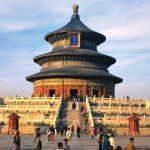
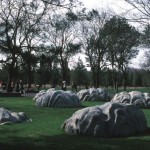
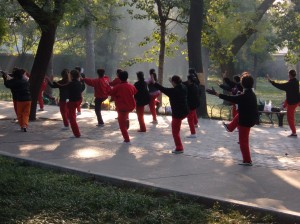
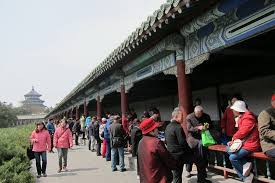
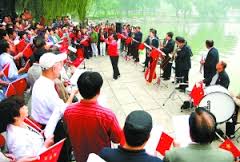
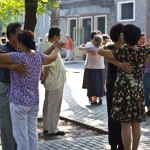
Even though we were only in China for a very short time, it was an incredible time. So many ideas, memories. One idea that keeps coming to mind is the importance of beauty and refinement. Another is the way that people share space, yet do it in a way that allows for self-expression. In China, there are so many activities going on in public spaces that would be in less public areas in the West!